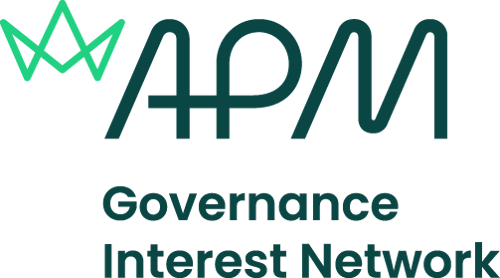
What is governance?
Definition
Governance is the framework of authority and accountability that defines and controls the outputs, outcomes and benefits from projects, programmes and portfolios.
The mechanism whereby the investing organisation exerts financial and technical control over the deployment of the work and the realisation of value.
Definition from APM Body of Knowledge 8thedition

Empowering
Governance empowers project professionals to execute their responsibilities by defining delegated limits of authority and establishing effective escalation routes for issues and change requests. Good governance also calls for the roles and responsibilities of the team and wider stakeholders to be clearly defined.
Governance provides confidence to the board of directors/trustees that investments in projects, programmes and portfolios are being well managed.
When governance is working well, it provides sufficient reporting and control activities to ensure that the sponsor and other senior leaders/stakeholders are kept informed of progress.
Assurance provides confidence to the governance board that the project, or wider programme or portfolio is on track to deliver the intended benefits.
- Assurance is independent, objective and proportionate to the work.
- Assurance is targeted where the greatest risks exist.
Watch: Governance, an enabler of project success
Governance board
A governance board is a body that provides sponsorship to a project, programme or portfolio. The board will represent financial, provider and user interests. Members of a governance board oversee deployment and make decisions through the chosen life cycle. Alternatively called steering committee, steering group, project board, programme board etc.
The sponsor plays a key role in establishing not only the structure of the board, but also its culture and working practices. Sponsors often chair governance boards.
Related reading






 A Guide to Integrated Assurance
A Guide to Integrated Assurance
Integrated assurance management is essential to project success.
The Guide to Integrated Assurance Management presents best practice for designing, implementing and operating assurance in the project environment.
This guide is designed for those accountable for the project or programme such as sponsors, and those who support them, including the PMO and internal auditors.
APM Body of Knowledge 8th edition
The APM Body of Knowledge is a foundational resource providing the concepts, functions and activities that make up professional project management. It reflects the developing profession, recognising project-based working at all levels, and across all sectors for influencers, decision makers, project professionals and their teams.

You may also be interested in

The APM Learning portal is an online resource which provides members with access to digital guides, modules and other digital learning resources as part of the membership benefit.

Browse our popular project management 'What is ...?' topics for definitions, quick insights, view related case studies, research, blogs and glossary.

Project – APM's official journal – is circulated quarterly for members only, and online for regularly updated news, blogs, opinions and insights for those in the project community.

The APM Community is our online community platform that connects our members faster and easier than ever before.



